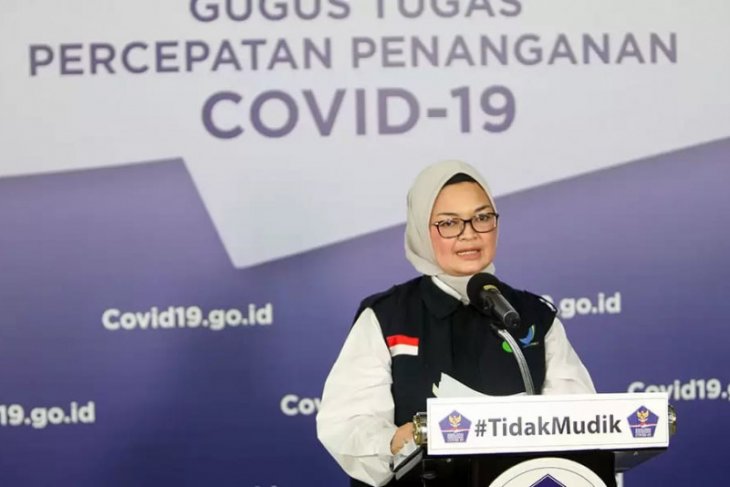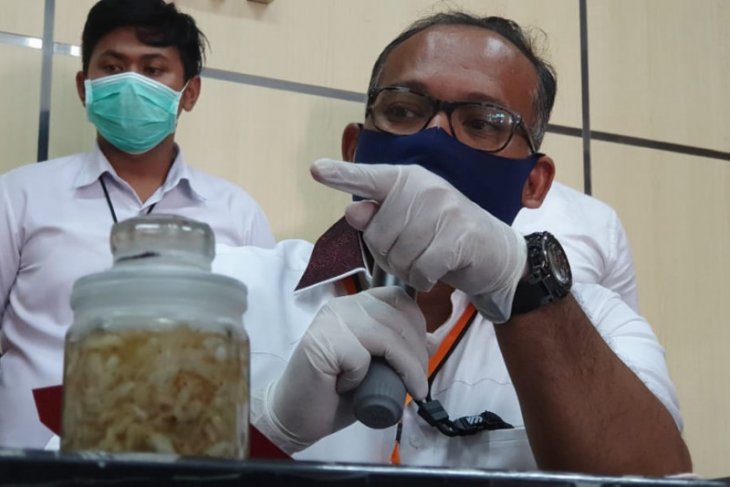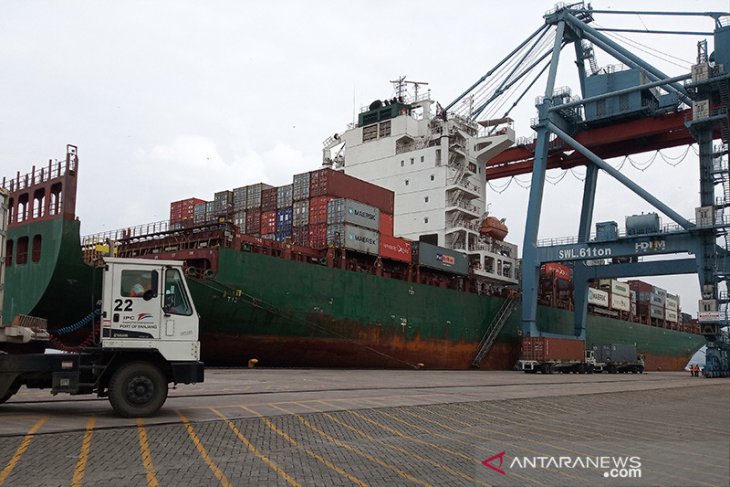Live Streaming
Program Highlight
Company Profile

Ani Hasanah
May

Head of the National Agency of Drug and Food Control (BPOM) Penny Lukito. ANTARA/HO-BPOM
The National Agency of Drug and Food Control (BPOM) has mobilized its resources throughout Indonesia to accelerate laboratory testing for novel coronavirus (SARS-CoV-2) specimens, according to BPOM Head Penny Lukito.
"We have mobilized all resources in the central office and branch offices in regions. We try our best to accelerate the handling of COVID-19, including the utilization of our laboratories for specimen testing," Lukito noted in a statement in Jakarta on Wednesday.
The laboratory testing is conducted at the National Center for Drug and Food Testing (PPPOMN) and 21 BPOM laboratories that have Real-Time Polymerase Chain Reaction (RT-PCR) kits.
Lukito noted that the agency will provide RT-PCR kits and conduct laboratory testing for COVID-19 in regions recording a major spike in the number of COVID-19 cases.
Five BPOM laboratories have been readied to expedite the COVID-19 specimen testing.
"The PPPOMN laboratory can test 300 samples per day, while BPOM in Gorontalo can test 200 samples daily; BPOM in Makassar, 150 samples per day; BPOM Jayapura, 90 samples per day; and BPOM Ambon, 180 samples per day," she remarked.
As of May, two BPOM laboratories have tested 868 specimens from the Wisma Atlet emergency hospital and Hajj Dormitory.
The BPOM laboratory in Gorontalo has tested 730 specimens during the period, while BPOM Jayapura and Ambon have respectively tested 41 and 153 RNA extractions for COVID-19 diagnosis.
"In addition, the PCR laboratory in Makassar is ready to operate for COVID-19 testing," she noted.
Currently, 16 BPOM offices, equipped with RT-PCR, are readied to lend the kits to laboratories in 16 provinces: Riau, West Sumatra, Bengkulu, Bangka Belitung, Jakarta, Central Java, West Nusa Tenggara (NTB), East Nusa Tenggara (NTT), Central Kalimantan, Southeast Sulawesi, Lampung, Jambi, East Java, West Kalimantan, North Sulawesi, and West Sulawesi. (ANTARA)
President Joko Widodo (Jokowi) installed Marshal Fadjar Prasetyo as the new chief of staff of the Indonesian Air Force (KSAU), succeeding Marshal Yuyu Sutisna.
President Jokowi led the swearing-in ceremony at the State Palace in Jakarta on Wednesday.
On the occasion, Jokowi also inducted Admiral Yudo Margono as chief of staff of the Indonesian Navy (KSAL).
Both were inaugurated in accordance with Presidential Decree No. 32 and 33 TNI 2020 on dismissal and appointment of KSAL and KSAU and Presidential Decree No. 34 and 35 TNI 2020 on promotion in the rank of TNI high-ranking officers.
Some 20 high-ranking officials attending the inauguration comprised Commander of the Indonesian Defense Forces (TNI) Marshal Hadi Tjahjanto, Indonesian National Police Chief Gen. Idham Azis, former KSAL Admiral Siwi Sukma Adji, former KSAU Marshal Yuyu Sutisna, Army Chief of Staff (KSAD) General TNI Andika Perkasa, Coordinating Minister for Politics, Law, and Security Affairs Mahfud MD, Defense Minister Prabowo Subianto, and Minister of State Secretary Pratikno.
Marshal Prasetyo had earlier assumed the post of commander of the Joint Regional Defense Command II (Pangkogabwilhan II).
Fadjar graduated from the Air Force Academy (AAU) in 1988. He had held crucial positions, such as commander-in-chief of the Air Force Operations Command (Pangkoopsau) I for the 2018-2019 period. During that time, Fadjar was viewed as having successfully conducted various operational tasks, such as the Lintas Rajawali operations, Tangkal Rajawali, Kawal Rajawali, Rajawali Wings, Lintas Udhaya, and Jalak Sakti exercises.
Fadjar began his career as a pilot of the A-4 Skyhawk in Squadron 11 Lanud Sultan Hasanuddin from 1990 to 1995. From 1995, he was assigned to serve as a pilot officer in the Air 17 Squadron Halim Perdanakusuma Air Force and to fly a Fokker F-28 aircraft, Boeing B-707. He then became commander of the 17th Air Squadron and flew a Boeing 737-200.
During the 2016-2018 period, Fadjar was the 39th Danlanud Halim Perdana Kusumah and later became Pangkoopsau II. (ANTARA)
May
The Ministry of Marine Affairs and Fisheries (KKP) Releases Nearly 20,000 Baby Lobsters in Pariaman

An officer with the Regional Police of East Java shows a jar containing baby lobsters, which were rescued and released after police thwarted an attempt to smuggle them to Malaysia. (ANTARA/HO-Regional Police of East Java/WI/sw)
The Ministry of Marine Affairs and Fisheries (KKP), through its Coast and Sea Resources Management Office in Padang, has released around 19,937 baby lobsters into Pariaman waters off West Sumatra after police rescued them from smugglers.
"The baby lobsters were alive when rescued, and hence, they were released, in compliance with Ministerial Decree Number 12 of 2020 on the management of lobsters, crabs, and blue crabs," Aryo Hanggono, director general of KKP's Ocean Space Management, said in Jakarta on Tuesday.
The lobsters were released into Pariaman waters, Pulau Angsa Duo, which is one of the conservation areas prioritized for such action.
On Saturday (May 16, 2020), local police in Jambi had thwarted an attempt by smugglers to ship the baby lobsters to Malaysia through Batam. The lobsters were originally caught from some regions in Java, Lampung, and Bengkulu.
The authorities responded immediately and seized the baby lobsters and released them on Sunday (May 17, 2020).
Minister of Marine Affairs and Fisheries Edhy Prabowo emphasized that baby lobsters can now to be exported within the license regulation that promotes their sustainability as well as fishermen's income.
"We demand the cultivators maintain two percent (of baby lobsters) for rejuvenation in their natural habitat. I think this could preserve their sustainability," Prabowo noted, adding that the baby lobsters can be exported after undertaking this measure.
According to a discussion with lobster experts from Australia's University of Tasmania, baby lobsters have about 70 percent chance of survival in their cultivation habitat, which is higher than their natural habitat. Hence, baby lobster exports would not endanger their population. (ANTARA)
May

Illustration of ship carrying goods containers docks at Container Terminal Port of Panjang, Lampung. (ANTARA/Agus Wira Sukarta/am/sw)
Indonesia Port Corporation (IPC) is currently preparing a scenario to better navigate through the new normal in terms of the work and operational environment at ports nationwide amid the ongoing COVID-19 pandemic.
"This new normal scenario is a follow-up measure to the health protocols been implemented in IPC's work and operational environments," Arif Suhartono, the IPC president, noted in a statement received in Jakarta on Tuesday.
"The precautionary measures to contain coronavirus transmissions among people at ports will serve as a reference for our new operational standards," he pointed out.
As the pandemic began, the State-Owned Enterprise too responded swiftly by applying some additional procedures for ensuring the health and safety of all its employees and related stakeholders.
Wearing masks and hand gloves has been incorporated in the regular requirement for wearing personal protective equipment, as this measure is deemed necessary to ensure unhindered port services despite the outbreak.
"Before the COVID-19 pandemic struck, all employees, including laborers involved in loading and unloading activities, are required to wear standard protective equipment, including helmets, vests, and special footwear (while working)," Suhartono noted.
Furthermore, during the outbreak, the IPC has implemented health protocols in the form of maintaining social and physical distancing, providing healthcare services, conducting body temperature checks, sanitizing workplaces, and applying new procedure for guest visits and official trips.
"To ensure that our operational process continues to run, the IPC readies deployment rules for enactment at all ports. Thus, all inbound and outbound shipments will not be affected by the community restrictions," Suhartono remarked. (ANTARA)


